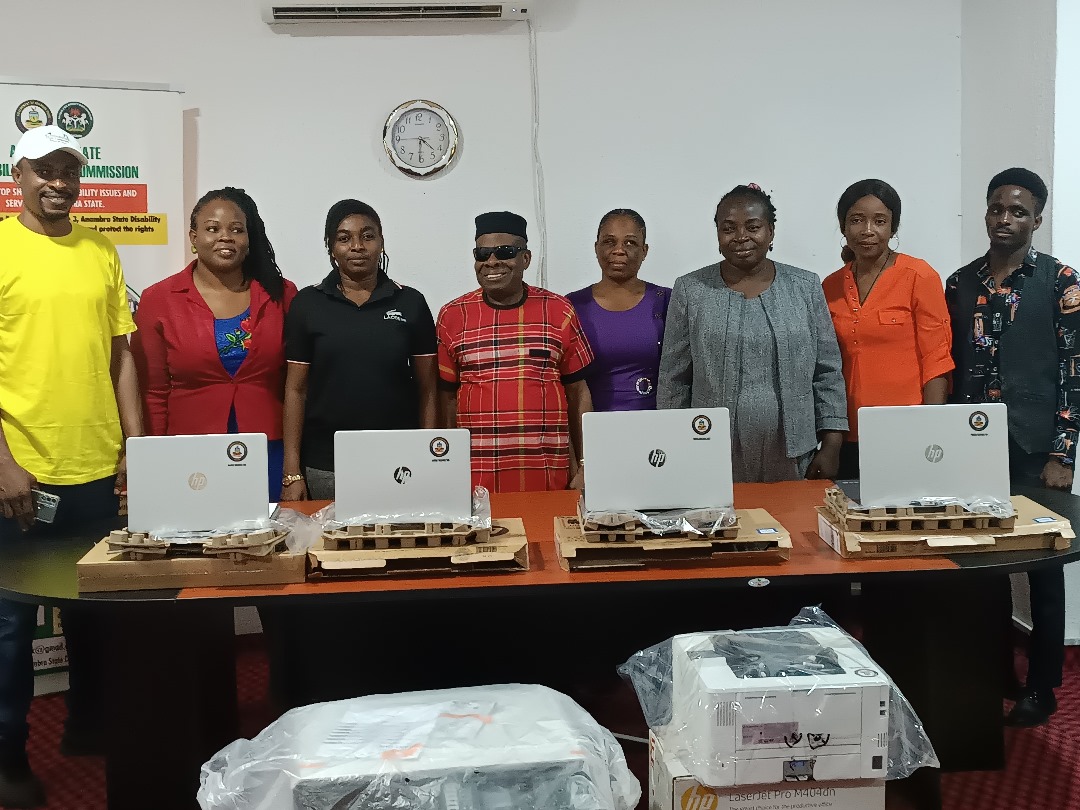News
Bridging the Digital Divide: Governor Soludo Empowers Disability Rights Commission

In alignment with Mr. Governor’s vision for “Everything Technology, Technology Everywhere,” the Disability Rights Commission recieved digital tools designed to transform how they advocate for and support persons with disabilities.

These tools will improve communication, enhance access to essential services, and foster inclusivity in decision-making processes.
With innovative software to boost accessibility, the Commission is now better equipped to fulfill its mandate and ensure that no one is left behind in the state’s digital transformation drive.
This integration of technology is a game-changer, empowering ‘those who need it most’.
This significant advancement was made possible through the collaborative efforts of the Anambra State ICT Agency, which played a crucial role in facilitating the digital transformation.
As part of its mission to drive e-government initiatives and support technology integration across state institutions, the agency provided the technical expertise and resources necessary to implement these tools effectively.
Receiving the digital tools, the Chairman of the Commission, Barr. Chuks Ezeawuzie, described it as a welcome development, highlighting the rapid pace of technological adoption and its potential to enhance productivity.
“Anyone without technology is still living in the stone age, the analog stage. But with these tools, our office is now digitalized,” he stated.
Barr. Ezeawuzie added, “We feel that the solution is here—solutions to our equipment problems.”
He noted that the pre-digital era involved strenuous work, particularly for those physically challenged.
However, with the provision of these tools by the Solution Governor, Prof. Charles Chukwuma Soludo, these challenges are being addressed.
Reflecting on his past, Ezeawuzie shared, “It reminds me of my time at the school for the blind, where everything was done manually and with great effort.
“During my postgraduate studies in the United States, I learned to appreciate how technology can enhance the lives of the blind.
“However, when I returned years before the Solution Government took office, there were no tools available to put that knowledge into practice.”
He added, “With these tools, not only will our productivity be enhanced, but they will also enable even more persons living with disabilities to receive training at our Access to Technology Training Center within the Commission.”
In addition to the digital tools, the Commission has also been provided with Cable TV, air conditioners, water dispensers, stabilizers, refrigerators, cameras, tripod stands, and others too numerous to mention, creating a more inclusive and functional work environment.
As the Disability Rights Commission steps into this new era of digital empowerment, it not only strengthens its capability to serve but also exemplifies Governor Soludo’s commitment to integrating technology into every facet of governance.
This initiative, supported by the Anambra State ICT Agency, underscores a broader vision where technology bridges gaps and fosters a more inclusive society, reflecting a promising future for all stakeholders involved.
News
IEEE CTU-EMEA Summit Organizers Hold Strategic Meeting with Baze University Management

The Local Organising Committee of the IEEE Connecting the Unconnected Europe, Middle East, and Africa (CTU-EMEA) Summit 2025 on Wednesday paid a courtesy visit to the management of Baze University, Abuja, in preparation for the international conference scheduled to hold from Nov. 27 to 28.

The visit, which brought together top officials from IEEE Nigeria Section and senior management of Baze University, focused on finalising arrangements for the summit themed “Bridging Digital Frontiers: African Solutions for Universal Connectivity.”
Speaking during the meeting, Mr. Chukwuemeka Gerald Okafor, General Conference Chair, described the summit as a historic milestone for Nigeria’s digital transformation agenda.
“This is the first time Nigeria is hosting an IEEE CTU international summit of this magnitude. Over 200 global leaders—ministers, regulators, CEOs, and innovators—will converge in Abuja to address the challenge of connecting 2.9 billion unconnected people worldwide,” Okafor said.
He disclosed that high-profile speakers had confirmed participation, including government ministers, representatives of the World Bank and International Telecommunication Union (ITU), telecom executives, and researchers from across the EMEA region.
Also speaking, Prof. Osita, Deputy Vice Chancellor (Academics), who represented the Vice Chancellor of Baze University, expressed the institution’s readiness to host the summit.
“We are honoured that IEEE selected Baze University as the venue for this prestigious event. It aligns with our vision of becoming a hub for technology innovation and global academic collaboration,” Osita said.
The summit programme includes an opening ceremony with ministerial presence, eight technical tracks, panel discussions, paper presentations, workshops, and an exhibition area for technology companies and startups.
Social events such as a Welcome Cocktail on Nov. 26 and a Gala Dinner on Nov. 28 are also planned to foster networking and collaboration.
Ms. Nneoma Offodile, Chair of the Local Organising Committee, said the summit would leave a lasting legacy for Nigerian students, especially those at Baze University.
“There will be volunteer opportunities, discounted registration, and exposure to global experts. We want students to benefit directly from this gathering,” she said.
The meeting also addressed logistical arrangements including venue setup, technology infrastructure, catering, accommodation, and security for international delegates.
IEEE, founded in 1884, is the world’s largest technical professional organisation with over 423,000 members globally. Its CTU programme focuses on bridging the digital divide through research, innovation, and stakeholder engagement.
Engr. Abdulateef Aliyu, IEEE Region 8 Representative, said the summit affirms Nigeria’s capacity to host world-class events and positions the country as a strategic hub for technology discourse in Africa.
The organising committee called on Nigerian ICT professionals, telecom operators, corporate sponsors, researchers, and students to participate actively in the summit.
Prof. Ifeayinwa Achumba, IEEE Nigeria Section Chair, said the summit would showcase scalable African solutions to global connectivity challenges.
Follow-up meetings are scheduled to finalise technical details and coordinate logistics ahead of the November event.
News
65m Nigerians Pushed into Poverty as GDP Per Capita Falls 66% – Report

Over 65 million Nigerians were reportedly pushed into poverty in 2024 following a 66 per cent decline in the country’s gross domestic product (GDP) per capita, according to a new report by Quartus Economics.

The report, titled “Forty Years of Structural Adjustment: Is Africa’s Eagle Stuck or Soaring Back to Life?”, examined Nigeria’s economic trajectory since the introduction of the Structural Adjustment Programme (SAP) in 1986.
Quartus noted that while the reforms helped grow Nigeria’s GDP from $87.5 billion in 1990 to $252 billion in 2024, the country’s economic structure remained fragile, with the naira losing 99.7 per cent of its value over the same period.
The report stated that liberalisation, privatisation, and banking reforms initially boosted private investment and manufacturing, but policy reversals and weak implementation undermined progress.
“Policy inconsistencies and weak implementation led to a recurring cycle of mixed results and missed opportunities,” the report said. “The goal of inclusive, export-led growth has remained elusive.”
Between 2014 and 2023, Nigeria experienced its worst growth slowdown in a generation, driven by falling oil prices, population pressures, restrictive fiscal and monetary policies, and governance lapses. Inflation rose above 30 per cent, capital inflows declined, and economic stagnation persisted.
However, the report praised the 2023–2024 reforms, including the removal of petrol and foreign exchange subsidies, as decisive measures that began correcting structural distortions.
By late 2024, GDP growth rebounded to nearly 4 per cent, with renewed strength in the manufacturing and mining sectors. Foreign reserves rose to $42 billion by October 2025, and inflation began to ease slightly.
Despite these improvements, Quartus warned that per capita income remains far below pre-crisis levels and that Nigeria’s export base and governance systems still face deep inefficiencies.
“The recovery is real, but lasting transformation will depend on discipline, continuity, and collective commitment to reform,” the report concluded.
News
BlueNoroff Targets Eecutives on Windows and MacOS Using AI-driven Tools

At the Security Analyst Summit in Thailand, Kaspersky’s Global Research and Analysis Team (GReAT) unveiled the latest BlueNoroff APT activity through two highly targeted malicious campaigns ‘GhostCall’ and ‘GhostHire’. The ongoing operations have been targeting Web3 and cryptocurrency organisations across India, Turkiye, Australia and other countries in Europe and Asia since at least April 2025.

BlueNoroff, a subdivision of the notorious Lazarus group, continues to expand its signature ‘SnatchCrypto’ campaign, a financially motivated operation which targets crypto industries worldwide. The newly described GhostCall and GhostHire campaigns employ new infiltration techniques and customised malware to compromise blockchain developers and executives. These attacks affect macOS and Windows systems as primary targets and are managed through a unified command-and-control infrastructure.
The GhostCall campaign focuses on macOS devices, beginning with a highly sophisticated and personalised social engineering attack. The attackers reach out via Telegram, impersonating venture capitalists and in some cases using compromised accounts of real entrepreneurs and startup founders to promote investment or partnership opportunities. The victims are invited to fake investment meetings on phishing sites mimicking Zoom or Microsoft Teams during which they are prompted to “update” their client to fix an audio issue, this action downloads a malicious script and deploys a malware infection on the device.
“This campaign relied on deliberate and carefully planned deception. Attackers replayed videos of previous victims during staged meetings to make the interaction appear like a real call and manipulate new targets. The data collected in this process is then used not only against the initial victim but also exploited to enable subsequent and supply-chain attacks, leveraging established trust relationships to compromise a broader range of organisations and users,” comments Sojun Ryu, security researcher at Kaspersky GReAT.
Attackers deployed seven multi-stage execution chains, four which were previously unseen, to distribute a range of new customised payloads, including crypto stealers, browser credential stealers, secrets stealer, and Telegram credential stealers.
In the GhostHire campaign the APT targets blockchain developers by posing as recruiters. Victims are tricked into downloading and running a GitHub repository containing malware, presented as a skill assessment. GhostHire shares its infrastructure and tools with the GhostCall campaign, but instead of using video calls, it focuses on approaching hands-on developers and engineers through fake recruitment. After initial contact, victims are added to a Telegram bot that delivers either a ZIP file or a GitHub link, along with a short deadline to complete the task. Once executed, the malware installs itself on the victim’s machine, customised for the operating system.
The use of generative AI has enabled BlueNoroff to accelerate malware development and refine its attack techniques. The attackers introduced new programming languages and added additional features, complicating detection and analysis tasks. It further enables the actor to manage and expand its operations, increasing both the complexity and scale of attacks.
“Since its previous campaigns, the threat actor’s targeting strategy has evolved beyond simple cryptocurrency and browser credential theft. The use of generative AI has significantly accelerated this process, enabling easier malware development with reduced operational overhead.
“This AI-driven approach helps to fill the gaps in available information, enabling more focused targeting. By combining compromised data with AI’s analytical capabilities, the scope of these attacks has expanded. We hope our research will contribute to preventing further harm,” comments Omar Amin, senior security researcher at Kaspersky GReAT.

 Telecom2 days ago
Telecom2 days agoMeta, NDPC to Finalize $32.8m Data Privacy Settlement Terms November 3

 E-Business2 days ago
E-Business2 days agoBuilding Trust, Accelerating Growth: Securing Africa’s Generative AI Future

 General News2 days ago
General News2 days agoPrince Nnamdi Ekeh, Oxford-Trained Tech Whizkid , CEO of Konga group, Honoured With Forbes and EuroKnowledge Award

 E-Business2 days ago
E-Business2 days agoCybersecurity Firm Shares a Guide to Deleting your Digital Footprint from the Internet

 Telecom2 days ago
Telecom2 days agoTransforming Africa: NITDA DG Makes Urgent Call for Digital Investment

 E-Financial2 days ago
E-Financial2 days agoSEC Says Nigerians Have Lost N316Bn to Ponzi Schemes

 General News2 days ago
General News2 days agoNIPR Launches Annual PRICE Awards, Ceremony Set for December 7, 2025

 E-Financial2 days ago
E-Financial2 days agoStandard Chartered Affirms Full Compliance with CBN’s N200Bn Capital Rule



























